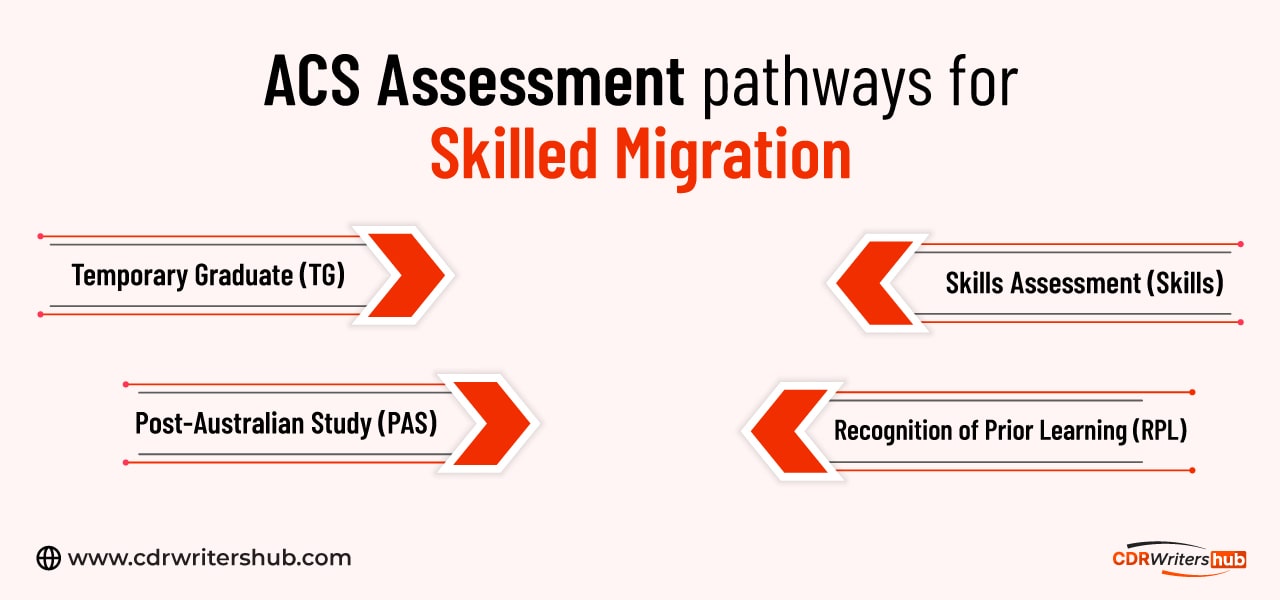What are many ways of ACS Assessment pathways for Skilled Migration?

What are many ways of ACS Assessment pathways for Skilled Migration?
Australian Computer Society is the main authority that looks over ICT professionals who want to migrate to Australia as skilled personnel. The main job of ACS is to evaluate potential applicants from overseas and from ICT professionals. They ensure applicants fulfill the relevant assessing authority standards for work in Australia’s chosen occupation. The Australian Computer Society will assess your information technology (IT) skills, knowledge, and expertise. Keep in mind that the Australian Computer Society only evaluates ICT workers for Skilled Migration. It can be considered a gateway for a permanent visa to Australia.
Basic skill assessment application requirements
Table of Contents
On the List of Eligible Skilled Jobs, the ACS has been identified as a relevant Assessing Authority for ICT skills occupations. Most evaluating organizations examine candidates’ abilities for the specific occupation based on their education, professional license (if applicable), and work experience. The most typical papers included in these applications are as follows:
- Transcripts with a certificate of graduation or award.
- Employment References.
- You must submit a project details report (RPL) Detail.
- Curriculum Vitae if you are applying for Recognition of Prior Learning.
- Personal identity documents include birth certificates, passports, and identification cards.
In some of these cases, applicants may be requested to provide a brief description of each component and its content in order to establish the degree’s relevance to the skill assessment profession. It is vital that all papers given to the Authority be translated, well-described, and certified copies so that your client does not lose out on any significant experience due to a lack of either an experience letter or the scope of work performed in that employment.
If you want to apply for skill evaluation in ACS for Australia Immigration, the following is a step-by-step procedure that you must complete.
1. The Department of Home Affairs (DHA)
Before applying for a skills assessment in Australia, make sure you meet the Department of Home Affairs’ qualifying conditions. In this case, if you are a newbie, it is critical to contact the top consultants who are registered with MARA in order to successfully apply for a skills evaluation in ACS for Australia Immigration.
2. Choosing the right ANZSCO code based on your ICT field
Applicants need to choose the correct ANZCO code that will match their skills and talents. You need to thoroughly check these occupation lists that best match your existing credentials and skillsets and then choose the appropriate field.
The assessing body analyzes your degrees and work experience to the standards of the ANZSCO code. Australia and New Zealand Standard Classification of Occupations (ANZSCO) collect, publishes, and analyzes occupational data across government agencies. It is used by the Department to gather information for all visa, settlement, and citizenship programs. Importantly, it is used as the criterion by which a visa applicant’s abilities and work experience to perform a certain vocation in Australia are evaluated under the skilled visa programs.
ANZSCO provides the level of qualification/s and experience required for specific professions, as well as the responsibilities that a candidate would do in that employment. If you apply for a skilled migration visa, the Department case officer reviewing your visa application will want to see documents demonstrating that you have completed the requisite qualifications and have adequate work experience as specified in ANZSCO for the relevant listed occupation.
3. Form of application
The last step is to complete the application form and obtain all of the required papers from the ACS. Check that all of your documents are certified copies in high-quality PDF format. Also, if you don’t want to deal with complications later, make sure all documents are genuine and include proper information.
On the List of Qualified Skilled Occupations, the ACS has been recognised as a relevant Assessing Authority for ICT skills occupations. Applicants will be able to choose between a number of evaluation tracks based on their educational background. In this part, we will show four ACS assessment tracks (application types) based on the criteria that you can take.
 Temporary Graduate (TG)
Temporary Graduate (TG)
- The applicants who have finished their bachelor’s degree or higher level are eligible for the temporary graduate (TG) application. The degree will be obtained from a reputable Australian university. This option, however, is qualification only skill evaluation and may only be taken by candidates applying for a subclass 485 visa.
Criteria for applicability
- The nominated occupation in subclass 485 for Medium and Long-term Strategic Skills List (MLTSSL) is appropriate for a Temporary Graduate track.
- A Bachelor’s degree or higher level in Australia with a major in ICT is required for the specified employment.
- Comply with the Australian Study Requirement (ASR) for visa purposes. ACS is not responsible for your ASR requirements. The Department of Home Affairs will handle it.
Post-Australian Study (PAS)
The applicants who have finished their Australian Bachelor’s degree or higher-level study and wish to have their skills assessed for migration reasons are eligible for Post-Australian Study. Post-Australian study necessitates the completion of an ACS Professional Year Program or other relevant employment in the ICT field.
Criteria for applicability
- Bachelor’s degree or higher education level in Australia with an ICT major in the chosen area.
- After completing a comparable Australian degree or a Professional year program, one year of work experience is required.
Skills Assessment (Skills)
This application pathway is utilized for tertiary ICT credentials and jobs in the general skill assessment category.
Criteria for applicability
Qualifications with an ICT major
- Applicants require two years of work experience in the related field that has been accomplished in the past ten years or four years completed at any time if your degree is an ICT major and is directly connected to your employment.
- Applicants from the ICT field who do not have employment related to their field must have four years of work experience. The work experience must be completed at any time to fulfill the criteria.
Qualification with ICT Minor
- Applicants require five years of related work experience accomplished in the last ten years or six years of work experience completed at any time if the degree is an ICT minor and is directly applicable to your job.
- Applicants will require six years of related work experience at any time to fulfill the criteria if their degree is an ICT minor that is not closely connected to the employment.
Qualification comparable to AQF Diploma or vendor Certification
- For ICT-related AQF degrees or vendor certifications, you must have five years of related work experience accomplished in the past 10 years or six years of work experience completed at any time to fulfill the criterion.
- You must have six years of related work experience accomplished at any time if your AQF degree or vendor certification is not closely related to your employment.
Recognition of Prior Learning (RPL)
The RPL application pathway is for applicants who do not have any ICT qualifications, applicants who have insufficient ICT content, or candidates who do not have any ICT material at all.
Criteria for applicability
Qualifications other than ICT that are comparable to an AQF Diploma or higher
- To fulfill the eligibility criteria, you must have six years of work experience accomplished anytime in the previous year, as well as an RPL application if your degree is classified as inadequate ICT with an equivalent AQF Diploma or higher.
No tertiary qualification is required; just job experience is required.
- To fulfill the eligibility criteria, if you do not have a tertiary educational certificate, you must have eight years of work experience completed in the preceding year and a Recognition of Prior Learning (RPL) application.
What you can do to improve your report’s quality?
- Specify the subjects for the main Area of Knowledge and demonstrate each item in detail in the box.
- Explain how you acquired your skills and knowledge and remark on the level of that information.
- Do not discuss all of the subtopics mentioned in the Area of Knowledge. As per the criteria, you must describe at least two subtopics.
- Make your explanations clear and descriptive.
- Each explanation should be no more than one to one and a half pages long.
Why should you choose CDRWritersHub to write your report?
CDRWritersHub offers a team of expert writers who can help you prepare your report. We offer CDR reports, ACS RPL reports, KA02 reports, career episodes, summary statements, CDR reviewing and a variety of other services. You are welcome to use our free samples as a reference. Get your report written by the top report writers in Australia.



